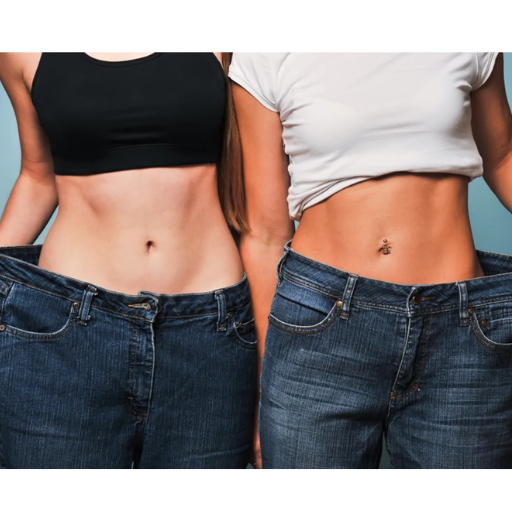Losing weight is often associated with exercise, with countless fitness programs and workout routines promoted as the key to shedding pounds. However, for many, the idea of losing weight without exercise seems like an impossible goal. Can you truly lose weight without stepping foot in a gym, running on a treadmill, or doing squats? The short answer is: yes, you can.
While exercise certainly plays a significant role in weight management, it is not the only factor that contributes to weight loss. Losing weight is largely about creating a calorie deficit, where you burn more calories than you consume. This can be achieved through several other methods that don’t involve rigorous workouts. These methods focus more on lifestyle changes, particularly in areas like diet, sleep, hydration, and stress management.
This approach is especially appealing to those who may find it difficult to commit to an exercise routine due to time constraints, physical limitations, or simply a lack of interest in working out. According to Dr. Michael Mosley, a well-known health expert and author of The Fast Diet, “It’s not necessary to exercise excessively to lose weight. What you eat and how you manage your daily habits are just as important.”
What’s encouraging is that these strategies are not only effective, but they also fit into a busy lifestyle without requiring drastic changes. In this article, we’ll discuss seven simple steps that can help you lose weight fast without exercise. These steps are rooted in science and proven to work for many people looking to shed unwanted pounds, focusing on habits that make a significant impact on your body’s ability to burn fat efficiently.
Let’s dive into the first essential step in losing weight without exercise: adjusting your diet to burn more calories.
High Quality Links
- Me71Fn Kevin James Weight Loss Journey Best Strategies To Slim Down
- MZGWz Top 6 Guidelines For Nurses How Much You Have To Exercise To

Step 1: Adjust Your Diet to Burn More Calories
The foundation of losing weight without exercise starts with one key principle: creating a calorie deficit. This means consuming fewer calories than your body burns. While exercise can help achieve this deficit, it’s absolutely possible to lose weight by making changes to your diet alone. According to Dr. Jason Fung, a renowned expert in weight loss and author of The Obesity Code, “Dietary changes have the power to create significant weight loss without the need for strenuous exercise. The key is in managing what and when you eat.”
Eating Fewer Calories, but Staying Full
One of the biggest challenges of losing weight without exercise is avoiding hunger while reducing calorie intake. However, there are strategies to ensure that you feel full while cutting back on calories. The key is to focus on nutrient-dense, low-calorie foods that provide satiety without packing on the pounds.
-
Fiber-Rich Foods: Foods high in fiber, such as vegetables, legumes, and whole grains, help keep you feeling full for longer. Fiber slows down digestion, which leads to sustained energy and less frequent hunger pangs. Aim to include foods like leafy greens, broccoli, and oats in your meals.
-
Protein-Packed Meals: Protein has a high thermic effect, meaning your body burns more calories during its digestion. Additionally, protein helps control hunger by regulating hunger hormones. Sources like chicken, turkey, eggs, and plant-based proteins like lentils and tofu are excellent choices.
-
Healthy Fats: While fats are calorie-dense, consuming the right types of fats in moderation can keep hunger at bay. Avocados, olive oil, and nuts are great sources of healthy fats that provide long-lasting satiety.
Key Foods to Include and Avoid for Weight Loss
Making mindful food choices is crucial when trying to lose weight without exercise. While it’s not necessary to eliminate all treats, incorporating the right foods and avoiding the wrong ones can greatly accelerate your progress.
Include:
- Non-Starchy Vegetables: Leafy greens, bell peppers, zucchini, and cucumbers are low in calories and packed with nutrients.
- Whole Grains: Quinoa, brown rice, and barley are fiber-rich and have a low glycemic index, which means they release energy slowly and help regulate blood sugar.
- Lean Protein: Chicken, turkey, fish, and plant-based proteins like chickpeas and beans are excellent options.
Avoid:
- Processed Foods: Junk food like chips, cookies, and fast food are calorie-dense and often contain unhealthy fats and refined sugars that can sabotage weight loss.
- Sugary Beverages: Soda, fruit juices, and other sugary drinks add calories without providing satiety. Opt for water, herbal teas, or black coffee instead.
- Refined Carbs: White bread, pastries, and pasta made from refined flour can spike your blood sugar and cause hunger shortly after eating.
Portion Control and Mindful Eating
Another important aspect of diet adjustments for weight loss is portion control. Even healthy foods can lead to weight gain if consumed in large quantities. Practicing mindful eating can help regulate portions by allowing you to listen to your body’s hunger cues and prevent overeating.
As nutritionist Dr. Rachael Hartley states, “Mindful eating involves paying attention to what and how much you’re eating, and understanding the signals your body sends when it’s full.” Slowing down during meals and savoring each bite can help you naturally eat less and avoid mindless overeating.
By adjusting your diet to burn more calories and incorporating these food strategies, you can start seeing progress in your weight loss journey without stepping foot in a gym. Now, let’s look at how staying hydrated can also play a significant role in weight loss.
Step 2: Stay Hydrated to Aid Weight Loss
Hydration is often overlooked when it comes to weight loss, but drinking enough water is one of the simplest and most effective ways to boost metabolism, reduce hunger, and help you shed pounds without exercise. In fact, studies show that even mild dehydration can slow down your metabolism and make it harder for your body to burn fat. According to the Mayo Clinic, “Water is essential for the proper functioning of every cell in your body, and it plays a key role in maintaining a healthy weight.”
How Drinking Water Boosts Metabolism and Suppresses Hunger
Drinking water before meals can increase feelings of fullness, leading to reduced calorie intake. This simple tactic, known as water-induced thermogenesis, has been shown to increase calorie expenditure by up to 30% for about 30-40 minutes after consumption, as demonstrated in a study published in The Journal of Clinical Endocrinology & Metabolism.
Water also helps your body metabolize stored fat more efficiently. When you’re hydrated, your kidneys can function properly, preventing your liver from having to work overtime to remove waste products. As a result, the liver can focus more on burning fat for energy.
Recommended Water Intake and Timing
The amount of water you need varies depending on factors such as age, weight, activity level, and climate. However, a general guideline is to aim for at least 8 cups (64 ounces) of water per day. For those who are more active or live in hot climates, you may need to increase your intake.
It’s not just about the quantity but also the timing of when you drink water. To maximize its fat-burning potential, try to:
- Drink a glass of water 30 minutes before meals: This can reduce appetite and prevent overeating.
- Sip water throughout the day: Keeping a water bottle at hand ensures you’re staying hydrated consistently, which helps regulate your metabolism.
- Drink cold water: Your body uses more energy to warm up cold water, which can slightly boost calorie burning.
Benefits of Drinking Herbal Teas and Water-Rich Foods
While plain water is an excellent choice, there are other hydrating options that can aid weight loss. Herbal teas, such as green tea, peppermint, and ginger tea, can be great alternatives. Green tea, in particular, contains catechins, antioxidants that have been shown to increase fat burning, especially when consumed regularly. According to a study published in the American Journal of Clinical Nutrition, drinking green tea can increase fat oxidation by as much as 17%.
Water-rich foods, like cucumbers, watermelon, and strawberries, also contribute to your hydration levels. These foods not only hydrate you but are low in calories and high in fiber, making them excellent choices for anyone looking to lose weight.
Lose Weight Fast Without Exercise: 7 Simple Steps That Actually Work
Avoid Sugary Drinks and Alcohol
When trying to lose weight without exercise, it’s crucial to avoid sugary beverages and alcohol, as they contribute unnecessary calories. Sugary drinks like soda, fruit juices, and energy drinks can add hundreds of empty calories to your daily intake without providing any nutritional benefits. Similarly, alcoholic drinks can stimulate appetite and reduce your willpower, leading to overeating.
By prioritizing hydration, you can naturally curb your appetite, support your metabolism, and improve overall fat-burning processes. So, next time you feel hungry or sluggish, reach for a glass of water or a cup of green tea before considering a snack. Now, let’s move on to the third step: improving your sleep to enhance fat loss.
Step 3: Improve Your Sleep for Better Fat Loss
It’s no secret that getting a good night’s sleep is crucial for overall health, but did you know that it plays a vital role in weight loss as well? Sleep deprivation can wreak havoc on your metabolism and increase the likelihood of weight gain. In fact, according to Dr. Matthew Walker, a sleep scientist and author of Why We Sleep, “Sleep deprivation triggers a cascade of metabolic disruptions that make it harder to lose weight and easier to gain it.”
The Connection Between Quality Sleep and Weight Loss
When you don’t get enough sleep, it disrupts the balance of hormones that regulate hunger. Two key hormones—ghrelin and leptin—are affected by poor sleep. Ghrelin stimulates appetite, while leptin signals fullness. When you don’t sleep well, your body produces more ghrelin and less leptin, making you feel hungrier and less satisfied after eating. As a result, you’re more likely to overeat and crave unhealthy foods.
Sleep deprivation also affects the body’s ability to metabolize glucose and store fat. Studies have shown that inadequate sleep leads to insulin resistance, a condition where the body becomes less effective at processing sugar. This can lead to higher fat storage, especially in the abdominal area, making weight loss even more challenging.
How Poor Sleep Impacts Metabolism and Fat Storage
When you’re sleep-deprived, your body enters a state of stress, which leads to an increase in cortisol, the “stress hormone.” Elevated cortisol levels are linked to fat accumulation, particularly around the belly. This is why chronic lack of sleep can result in stubborn weight gain that is difficult to shed, even when you’re making other healthy changes.
A study published in the American Journal of Clinical Nutrition found that people who sleep less than 6 hours per night tend to consume more calories, especially from high-fat and sugary foods. This creates a perfect storm for weight gain—higher appetite, lower energy expenditure, and more fat storage.
Tips for Getting Restful Sleep Without Exercise
Improving your sleep quality is a key strategy in losing weight without exercise. Here are some practical tips to help you get better sleep and, in turn, support your weight loss efforts:
-
Create a Consistent Sleep Schedule: Go to bed and wake up at the same time every day, even on weekends. This helps regulate your body’s internal clock and improves the quality of your sleep.
-
Limit Blue Light Exposure: Exposure to screens (phones, computers, TVs) before bed can interfere with your ability to fall asleep. The blue light emitted from these devices suppresses the production of melatonin, a hormone that helps you sleep. Aim to avoid screens at least an hour before bedtime.
-
Optimize Your Sleep Environment: Make your bedroom conducive to sleep by keeping it dark, quiet, and cool. Consider using blackout curtains and a white noise machine if necessary.
-
Relax Before Bed: Engage in calming activities such as reading, meditating, or practicing deep breathing exercises to signal to your body that it’s time to wind down. Avoid caffeine or heavy meals late in the day.
-
Exercise, But Not Right Before Bed: While you’re focusing on losing weight without exercise, remember that moderate exercise earlier in the day can improve sleep quality. However, vigorous exercise close to bedtime can have the opposite effect by increasing adrenaline levels and making it harder to fall asleep.
The Importance of Sleep for Long-Term Weight Management
Getting enough sleep is not just a short-term fix for weight loss; it’s an essential component of sustainable weight management. A consistent sleep routine helps regulate your hormones, improve fat-burning processes, and increase your overall energy levels. When your body is well-rested, you’re more likely to make better food choices and stick to healthy habits, ultimately leading to more successful weight loss.
By prioritizing restful sleep, you can create a powerful foundation for losing weight without exercise. But it doesn’t stop there—your next step in this weight loss journey is to manage stress, which we’ll explore in the next section.

Step 4: Manage Stress to Prevent Emotional Eating
Stress is a common trigger for overeating and weight gain, particularly when it leads to emotional eating. When you’re under stress, your body releases cortisol, the “stress hormone,” which has been linked to an increase in appetite and fat storage, particularly around the abdominal area. According to Dr. Mark Hyman, a functional medicine doctor and author of The Blood Sugar Solution, “When you’re stressed, your body is in a fight-or-flight state, which drives hunger and cravings for high-calorie, comfort foods.”
The Role of Stress in Overeating and Weight Gain
Stress affects not only your emotional well-being but also your physical health and weight loss goals. Cortisol, which is released in response to stress, can cause cravings for foods that are high in sugar and fat, especially comfort foods like chips, cookies, or ice cream. These foods temporarily soothe the stress response, but they come with the cost of added calories, making it harder to maintain a calorie deficit for weight loss.
Moreover, chronic stress can lead to an imbalance in the hunger-regulating hormones ghrelin and leptin, making you feel hungrier and less satisfied after meals. This can lead to overeating, even when you’re not physically hungry.
Practical Techniques to Reduce Stress
Managing stress effectively is not only important for emotional health but also for your weight loss journey. By reducing stress, you can prevent the cycle of emotional eating and create a more balanced relationship with food. Here are some effective techniques to help you manage stress and stay on track with your weight loss goals:
-
Practice Mindfulness Meditation: Meditation is a powerful tool for reducing stress and anxiety. By taking a few minutes each day to sit quietly and focus on your breathing, you can activate the parasympathetic nervous system, which helps reduce cortisol levels and promotes relaxation. Research shows that mindfulness meditation can significantly lower stress and improve overall mental well-being.
-
Try Yoga or Deep Breathing Exercises: Yoga, with its combination of breathing exercises and gentle movement, can help relax both the body and mind. It has been shown to reduce cortisol levels and improve emotional regulation. Similarly, deep breathing techniques can quickly calm the nervous system and help you regain control over stress-induced cravings.
-
Engage in Regular Relaxation Activities: Regularly participating in activities that relax and rejuvenate you can help lower stress. Whether it’s spending time in nature, taking a warm bath, reading a book, or engaging in a creative hobby, these activities can help you unwind and keep your stress levels in check.
-
Exercise Moderately: While this article focuses on weight loss without rigorous exercise, it’s worth noting that even low-intensity movement, like walking or stretching, can help reduce stress. Physical activity releases endorphins, the body’s natural “feel-good” hormones, which help combat stress and boost mood.
How Stress Management Helps Balance Hormones
Reducing stress is critical for balancing the hormones that influence hunger and fat storage. Lowering cortisol levels through stress management techniques can lead to better regulation of appetite and a decrease in emotional eating. Furthermore, managing stress helps improve sleep quality, which, as we’ve discussed earlier, is also essential for weight loss.
In the long term, effective stress management can create a healthier relationship with food and help you stick to your weight loss goals. As Dr. Amy Myers, a functional medicine expert, states, “When you take care of your mental and emotional health, your body can focus on burning fat, rather than holding onto it for survival.”
By managing stress effectively, you can prevent emotional eating and create a more sustainable environment for weight loss. Now, let’s move on to the next step: increasing your daily movement in small ways.
